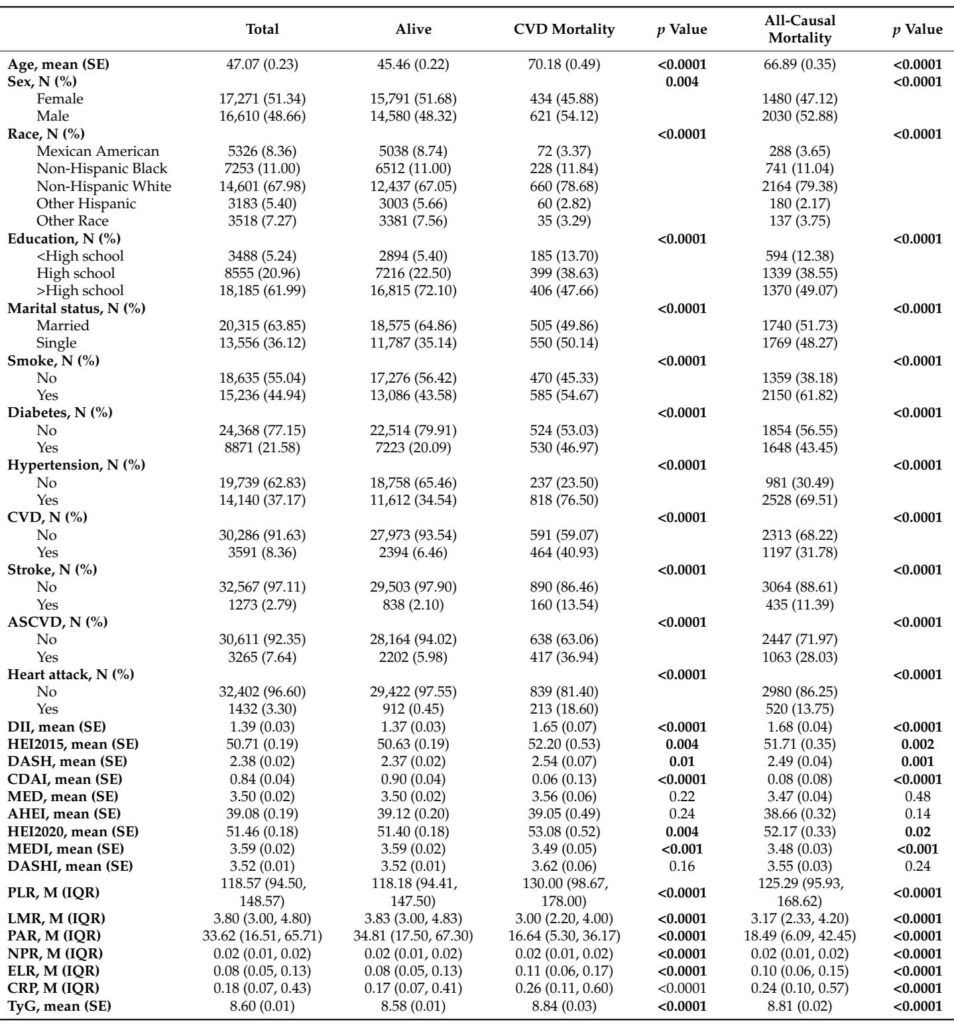Highlight
- The alternate Mediterranean Diet (aMED) shows the strongest causal association with lowered all-cause and cardiovascular mortality compared with eight other common dietary indices.
- Dietary inflammatory potential, quantified by the Dietary Inflammatory Index (DII), consistently elevates mortality risk.
- Systemic inflammation markers, especially neutrophil-to-platelet ratio (NPR), systemic immune-inflammation index (SII), and C-reactive protein (CRP), significantly mediate the diet–mortality relationship across multiple dietary patterns.
- Linear dose–response relationships advocate for incremental dietary improvements to reduce mortality risks population-wide.
Introduction
Cardiovascular disease (CVD) continues to be a dominant cause of global mortality, with incidence and deaths steadily rising over recent decades. Nutrition is a pivotal modifiable determinant that influences diverse pathophysiological processes underlying CVD, including systemic inflammation, lipid metabolism, and hypertension. Multiple dietary indices have been developed to evaluate diet quality, ranging from guideline-based scores such as the Healthy Eating Index (HEI) to pattern-centric measures like the Mediterranean Diet indices and inflammation-focused indices like the Dietary Inflammatory Index (DII).
Despite the availability of these indices, their relative effectiveness in reducing mortality within the same population has not been extensively compared. This gap is compounded by methodological challenges inherent to observational nutrition research, including confounding and inappropriate adjustment for mediators. To overcome these, causal inference frameworks using directed acyclic graphs (DAGs), propensity score methods, and mediation analyses have emerged to delineate robust associations closer to causal interpretations.
This study leverages data from the National Health and Nutrition Examination Survey (NHANES) spanning 2005–2018 to conduct a comparative causal analysis of nine dietary indices. Additionally, it investigates the mediating role of inflammatory biomarkers to elucidate biological mechanisms linking diet and mortality risk.
Study Design
This observational cohort study analyzed 33,881 adults aged 20 years or older with complete dietary recall, inflammatory biomarker, and mortality linkage data from NHANES 2005–2018 with follow-up through December 2019 (median 92 months). Nine dietary indices—DII, Composite Dietary Antioxidant Index (CDAI), alternate Mediterranean Diet score (aMED), PREDIMED-based Mediterranean Diet Index (MEDI), Alternate Healthy Eating Index (AHEI), HEI-2015, HEI-2020, Dietary Approaches to Stop Hypertension (DASH), and DASH Index (DASHI)—were calculated from 24-hour dietary recalls.
Inflammatory biomarkers including C-reactive protein (CRP), neutrophil-to-platelet ratio (NPR), systemic immune-inflammation index (SII), platele-to-albumin ratio (PAR), lymphocyte-to-monocyte ratio (LMR), platelet-to-lymphocyte ratio (PLR), eosinophil-to-lymphocyte ratio (ELR), and triglyceride–glucose index (TyG) were obtained from standardized laboratory measurements.
Directed acyclic graphs identified confounders (age, sex, race/ethnicity, education, marital status, smoking, alcohol, poverty–income ratio, BMI, and physical activity) for minimum adjustment, explicitly excluding chronic diseases considered mediators. Multiple imputation addressed missing data. Generalized propensity score matching using random forests balanced confounders across dietary quality levels, followed by robust Cox proportional hazards regression to estimate causal hazard ratios (HRs) for all-cause and cardiovascular mortality. Restricted cubic spline models examined dose-response relationships.
Multiple mediation analysis via Multiple Additive Regression Trees (MART) quantified the proportion of diet–mortality effects mediated by inflammatory biomarkers.
Key Findings
Of the study cohort (mean age 47.07 years; 51.34% female), 4,230 deaths occurred, including 827 cardiovascular deaths. Baseline comparisons revealed that decedents were older, predominantly male, less educated, more likely smokers, and had higher inflammatory marker profiles.
Causal effects estimated through propensity score matching and Cox regression demonstrated:
– The DII increased all-cause and cardiovascular mortality risk by 7% per unit increase (HR 1.07, 95% CI 1.02–1.12 and HR 1.07, 95% CI 1.04–1.10, respectively).
– The alternate Mediterranean Diet score (aMED) significantly lowered all-cause mortality by 12% (HR 0.88, 95% CI 0.80–0.97) and cardiovascular mortality by 11% (HR 0.89, 95% CI 0.80–0.98) per unit increase.
– The PREDIMED-based Mediterranean Diet Index (MEDI) showed similar protective associations.
– Other indices (CDAI, AHEI, HEI-2015, HEI-2020) provided modest 1–3% risk reductions.
– DASH and DASHI showed minimal or no significant association with cardiovascular mortality.
Restricted cubic spline analysis revealed primarily linear dose–response associations across indices, with no threshold effects, indicating continuous benefit from improved diet quality.
Multiple mediation analysis identified inflammatory markers—CRP, NPR, and SII—as robust mediators of diet–mortality pathways across all dietary indices. For instance, among the aMED and MEDI, these markers accounted for significant portions of the mortality risk reduction, highlighting inflammation modulation as a principal biological mechanism. The involvement of markers like LMR also suggested nuanced immunological pathways influenced by Mediterranean diets.
Sensitivity analyses excluding imputed data and E-value calculations underscored the robustness of findings and minimized likelihood of unmeasured confounding fully explaining results.
Expert Commentary
This study’s use of a rigorous causal inference framework advances nutrition epidemiology by clarifying the comparative benefits of widely referenced dietary patterns in mortality prevention. The superior efficacy of the Mediterranean diet aligns with randomized controlled trial evidence yet offers enhanced mechanistic insights by demonstrating inflammatory biomarker mediation. This positions inflammation as a critical therapeutic target for dietary interventions and supports personalized monitoring using biomarkers like NPR and SII.
The modest effects observed with DASH may reflect medication confounding and surrogate endpoint paradox, as well as population heterogeneity in the NHANES sample. These nuances highlight the necessity of causal analysis for interpreting complex observational data.
Limitations include reliance on single 24-hour dietary recalls subject to recall bias and inability to assess longitudinal dietary adherence. Cross-sectional diet and disease measurement pose challenges for causal directionality but were addressed by excluding diseases as confounders in the model. Moreover, findings may have limited generalizability beyond the US population.
Conclusion
This comprehensive causal inference study provides compelling evidence that Mediterranean dietary patterns confer the greatest reductions in all-cause and cardiovascular mortality, principally through anti-inflammatory mechanisms mediated by systemic immune-inflammatory indices. The linear dose-response relationship encourages population-wide dietary improvements rather than selective targeting. Integration of inflammatory biomarkers into clinical practice could enhance dietary intervention effectiveness and risk stratification.
Future research should focus on prospective randomized trials incorporating inflammatory biomarker endpoints and explore culturally-adapted Mediterranean-style diets in diverse populations to translate these findings into global health strategies.
References
Lin J, Wang Q, Liu X, Zhou M, Feng Z, Ma X, Li J, Gan R, Wang X, Li K. Causal Inference Framework Reveals Mediterranean Diet Superiority and Inflammatory Mediation Pathways in Mortality Prevention: A Comparative Analysis of Nine Common Dietary Patterns. Foods. 2025 Sep 6;14(17):3122. doi: 10.3390/foods14173122. PMID: 40941239; PMCID: PMC12427978.


